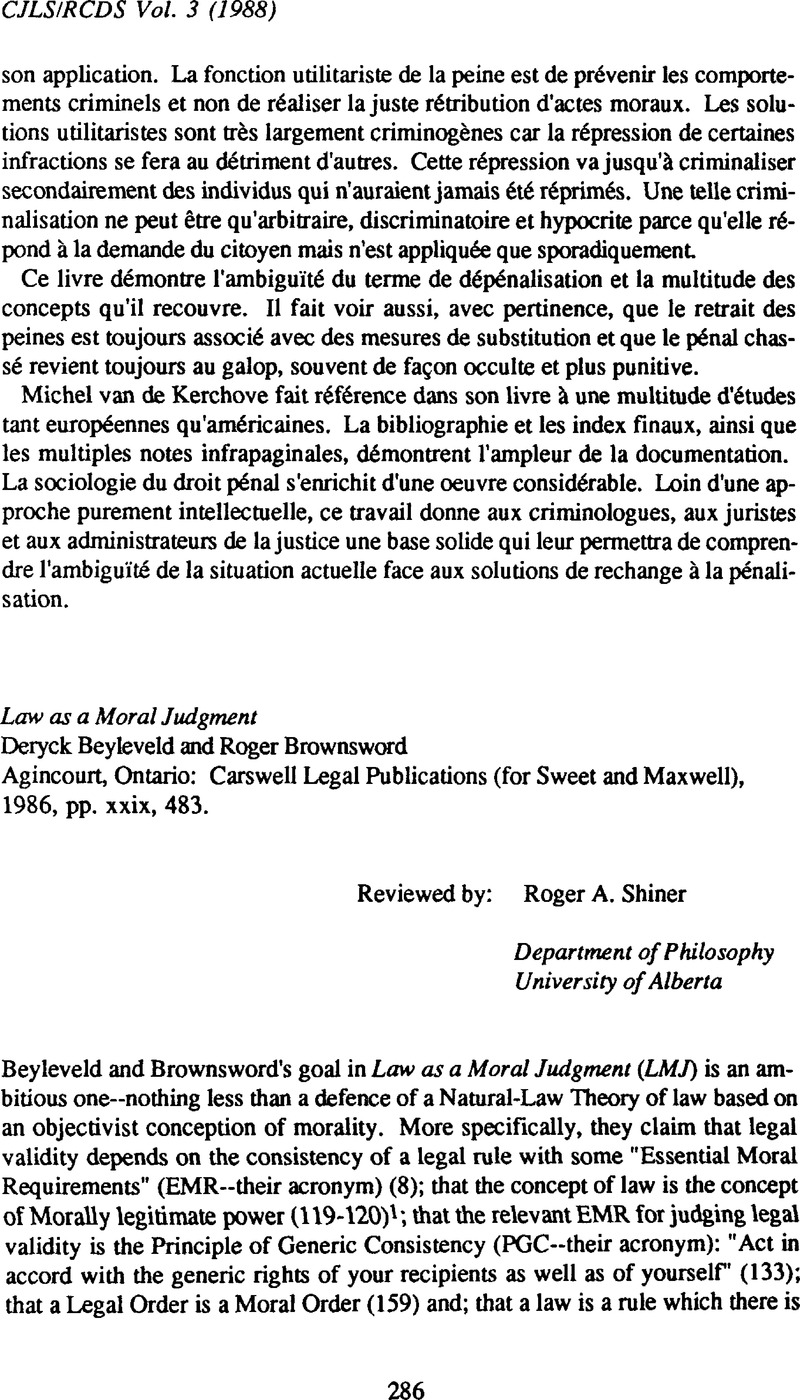No CrossRef data available.
Article contents
Law as a Moral Judgment. Deryck Beyleveld and Roger Brownsword. Agincourt, Ontario: Carswell Legal Publications (for Sweet and Maxwell), 1986, pp. xxix, 483.
Published online by Cambridge University Press: 18 July 2014
Abstract

- Type
- Reviews/Recensions
- Information
- Canadian Journal of Law and Society / La Revue Canadienne Droit et Société , Volume 3 , 1988 , pp. 286 - 295
- Copyright
- Copyright © Canadian Law and Society Association 1988
References
Notes
1. The capital letters in “Legal,” “Moral,” and cognates signify a crucial distinction for Beyleveld and Brownsword. Capitalized “Legal”/“Moral” are opposed to “non-legal”/“non-moral: uncapitalized “legal”/“moral” are opposed to “illegal”/“immoral.” The importance of the distinction will appear anon.
2. See Gewirth, Alan, Reasons and Morality (Chicago: University of Chicago Press, 1978)Google Scholar.
3. On this see, for example, Summers, Robert, Instrumentalism and American Legal Theory (Ithaca, N.Y.: Cornell University Press, 1982)Google Scholar, Introduction; Unger, Roberto, The Critical Legal Studies Movement (Cambridge, Mass.: Harvard University Press, 1986)Google Scholar, chapters 1 and 2.
4. The legal positivist Raz, Joseph (cf. Practical Reason and Norms [London: Hutchinson, 1975]Google Scholar, The Authority of Law [Oxford: Clarendon Press, 1979])Google Scholar so characterizes law in the course of offering his version of Legal Positivism. I believe that these remarks are boring pre-philosophical remarks about law as a social institution--remarks which simply identify the entity of which legal theory is the theory. The remarks thus in themselves tell neither for nor against either Legal Positivism or Natural-Law Theory. Beyleveld and Brownsword act as though they also believed this, although nothing specific is said.
5. Fuller, Lon, The Morality of Law (New Haven, Conn.: Yale University Press, 1969)Google Scholar, chapter 2.
6. Detmold, Michael J., The Unity of Law and Morality (London: Routledge and Kegan Paul, 1984)Google Scholar.
7. Weinreb, Lloyd L., Natural Justice and Law (Cambridge, Mass.: Harvard University Press, 1987)Google Scholar. Weinreb shares with Beyleveld and Brownsword a Kantian inspiration and the desire for an objectivist Natural-Law Theory. However, Weinreb's theory is much more distinctively American-liberal in substance and indeed his book is more a treatise in the theory of political morality than is LMJ.
8. Finnis, , Natural Law and Natural Rights (Oxford: Clarendon Press, 1980)Google Scholar.
9. Soper, , A Theory of Law (Cambridge, Mass.: Harvard University Press, 1984)CrossRefGoogle Scholar. Soper's book is surprisingly not mentioned by Beyleveld and Brownsword--surprisingly, for two reasons. First, the book was out well in time and not only is every other major legal theorist mentioned by Beyleveld and Brownsword but a good many minor ones also. Second, Soper takes the key question for legal theory to be, “What is law that we should obey it,” a very Beyleveld and Brownsword-ish question. Moreover, he too highlights the good faith of officials' attempts to govern in the interests of the community as the moral grounds for legal obligation. However, given that Soper omits any ‘achievement’-based, rather than ‘attempt’-based, ground for obligation, his theory is hugely different from Beyleveld and Brownsword's. It does not qualify as a Natural-Law Theory at all and indeed Soper offers it as a third alternative to both Natural-Law Theory and Legal Positivism.
10. An invaluable, clear and thorough ‘Analytical Table of Contents’ at the beginning of the book perhaps betrays a rueful recognition of the likely success of this disturbing prediction.
11. I imply in footnote 9 that Beyleveld and Brownsword should have discussed Soper, not because I think the book is too short, but because I think targets have been too unselectively chosen.
12. I believe in fact that a profound revision is needed of our way of understanding the job of legal theory to accommodate the impossibility of an Archimedean decision-point. This claim is the main theme of my Norm and Nature: The Movements of Legal Thought (in preparation).
13. Some of the main critical articles are in Regis, Edward Jr., (ed.), Gewirth's Ethical Rationalism (Chicago: University of Chicago Press, 1984)Google Scholar. Attention to The Philosophers' Index will turn up many more.
14. It is interesting that Weinreb (108ff.), while he initially criticizes Finnis and others for doing moral theory, not legal theory, chiefly in fact criticizes them for having the wrong moral theory. If it is a mistake for legal theorists to do moral theory, then Weinreb himself also makes it.
15. See, for example, Twining, William, “Academic Law and Legal Philosophy: The Significance of Herbert Hart,” Law Quarterly Review 95 (1979), 557Google Scholar. More of my own view on this topic may be found in “Hermeneutics and the Internal Point of View to Law,” in Pattaro, Enrico (ed.), La Ragione nel Diritto (Milano: Giuffre, 1988), Volume IIGoogle Scholar.
16. See the Preface to Hart, H.L.A., The Concept of Law (Oxford: Clarendon Press, 1961)Google Scholar. Beyleveld and Brownsword also valuably bring out this aspect of Hart--ct. 80, 214-18, and their criticism of ‘conventionalism’ in chapter 3.
17. Harré, R. and Secord, P., The Explanation of Social Behaviour (Oxford: Blackwells, 1972)Google Scholar.
18. See Winch, Peter, The Idea of a Social Science (London: Routledge and Kegan Paul, 1958)Google Scholar, and many other writings.
19. For an initial defence of the possibility, see MacCormick, D.N., H. L. A. Hart (Stanford, Conn.: Stanford University Press, 1982), chapter 3Google Scholar; Gadamer, Hans-Georg, Truth and Method (New York: Crossroad, 1982), 285–303Google Scholar.




